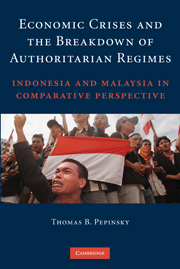 Economic Crises and the Breakdown of Authoritarian Regimes
Economic Crises and the Breakdown of Authoritarian Regimes Book contents
- Frontmatter
- Contents
- List of Tables
- List of Figures
- Acknowledgments
- Terms and Abbreviations
- 1 Crises, Adjustment, and Transitions
- 2 Coalitional Sources of Adjustment and Regime Survival
- 3 Authoritarian Support Coalitions: Comparing Indonesia and Malaysia
- 4 Adjustment Policy in Indonesia, June 1997–May 1998
- 5 Adjustment Policy in Malaysia, June 1997–December 1999
- 6 Authoritarian Breakdown in Indonesia
- 7 Authoritarian Stability in Malaysia
- 8 Cross-National Perspectives
- 9 Conclusions
- References
- Index
5 - Adjustment Policy in Malaysia, June 1997–December 1999
Published online by Cambridge University Press: 21 January 2010
- Frontmatter
- Contents
- List of Tables
- List of Figures
- Acknowledgments
- Terms and Abbreviations
- 1 Crises, Adjustment, and Transitions
- 2 Coalitional Sources of Adjustment and Regime Survival
- 3 Authoritarian Support Coalitions: Comparing Indonesia and Malaysia
- 4 Adjustment Policy in Indonesia, June 1997–May 1998
- 5 Adjustment Policy in Malaysia, June 1997–December 1999
- 6 Authoritarian Breakdown in Indonesia
- 7 Authoritarian Stability in Malaysia
- 8 Cross-National Perspectives
- 9 Conclusions
- References
- Index
Summary
Malaysians often remarked during the early months of 1998 that every time Prime Minister Mahathir Mohamad opened his mouth, the ringgit depreciated. It was not hard to see why. As the Kuala Lumpur Stock Exchange (KLSE) tumbled and the ringgit depreciated, Mahathir's public demeanor ranged from defiant to vitriolic. He blamed Malaysia's currency and financial crisis on hostile “rogue” factions from George Soros to Western colonialists to the International Monetary Fund to a global Jewish conspiracy. In contrast to the positive reviews of Soeharto's crisis management in the first months of Indonesia's crisis, Mahathir's outbursts earned him condemnation from the foreign investment community. Confronted with what seemed to be an increasingly unhinged autocrat, foreign observers lambasted Mahathir for ignoring his regime's own failures in macroeconomic planning, and for downplaying the policy mismanagement that became ever more apparent as foreign investors took a second look at Malaysia.
Mahathir's public persona hid the regime's struggles over adjustment policy. The government's initial steps were actually encouraging from the IMF's perspective and included a vow to eliminate wasteful public expenditures and pledges of fiscal discipline by Anwar Ibrahim. In his words, these adjustment measures amounted to “IMF without the IMF.” Yet the regime's commitment to IMF-style policies was short-lived. Interest rate hikes to encourage capital inflows were temporary and not nearly as sharp as those in other crisis countries. The regime restarted many of the postponed infrastructure projects, using the logic of “strategic investment” to excuse what were clearly uneconomic ventures.
- Type
- Chapter
- Information
- Economic Crises and the Breakdown of Authoritarian RegimesIndonesia and Malaysia in Comparative Perspective, pp. 119 - 154Publisher: Cambridge University PressPrint publication year: 2009
